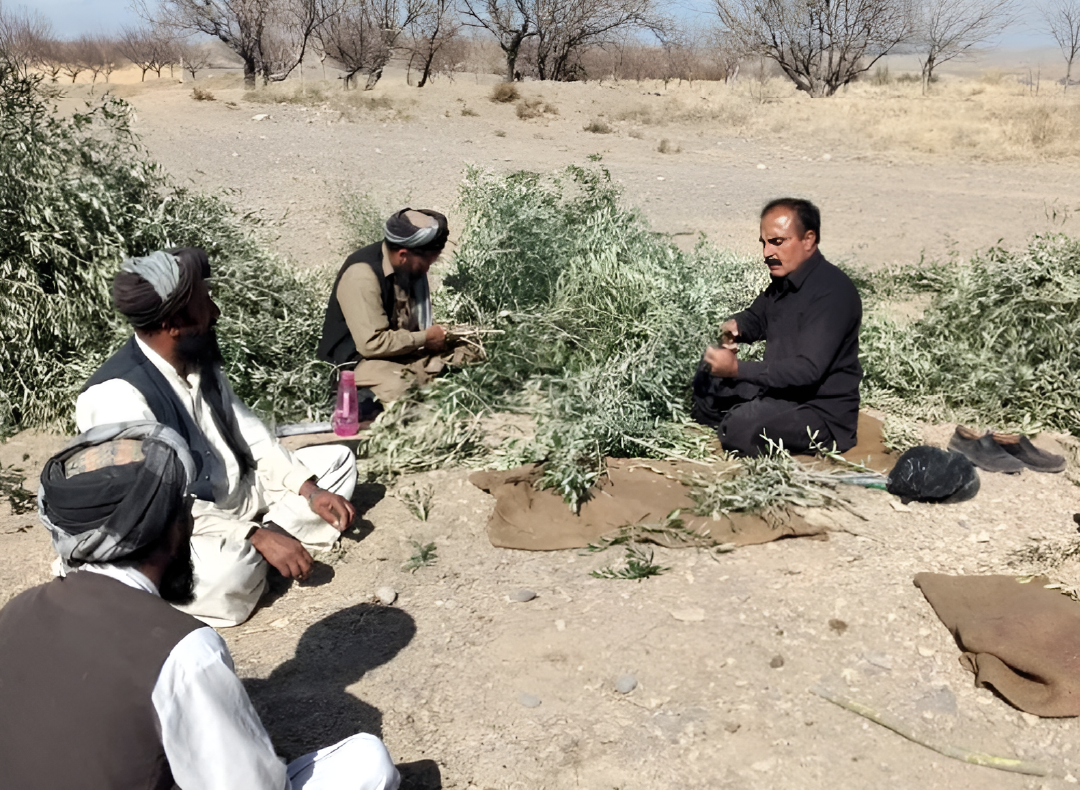Balochistan’s olive oil gaining global recognition as crop cultivation multiplies in the province
Balochistan is quietly writing a new chapter in its agriculture with olive cultivation. Its center is Loralai where more than 1 million trees of various olive varieties from Italy and Spain have been planted so far with government cooperation and the interest of farmers.
Olive oil obtained from the orchard of Loralai farmer, Abdul Jabbar, recently won the Silver Award at the New York International Olive Oil Competition that had 1,200 brands as contestants from around the world. Jabbar extracted more than 9,000 liters of olive oil from his 30-acre orchard last year, a testament to the extraordinary productivity of the area.
The company ‘Khaiti Technologies’, which owns the award-winning brand ‘Loralai Olive’, had obtained 10 tonnes of oil from the district this year. According to a representative of the company, they are targeting to take the oil production to 25 to 30 tonnes next year.
In Sherani district of Zhob division, wild olive trees already exist on more than 100,000 acres, of which 15,000 acres are the government property and the rest are private. All these trees are being grafted with high-quality varieties. According to a farmer in the area, after the grafting, they are getting 3,000 to 4,000 litres of oil from these grafted trees annually, which brings them an annual income of more than Rs1m.
The quality of olives from Balochistan is much better than those grown in other parts of the country. Here, 22 to 28 litres of oil are being extracted from 100kg of fruit while 10 to 16 litres are extracted in other provinces.
In Loralai district alone, 62,000 litres of oil has been extracted from the current year’s (2025) crop. Currently, the highest production is seen in Loralai, Musakhel, Zhob, Barkhan, Qila Saifullah and Pishin. The moderate temperature and specific soil of these semi-mountainous areas are very suitable for olive cultivation.
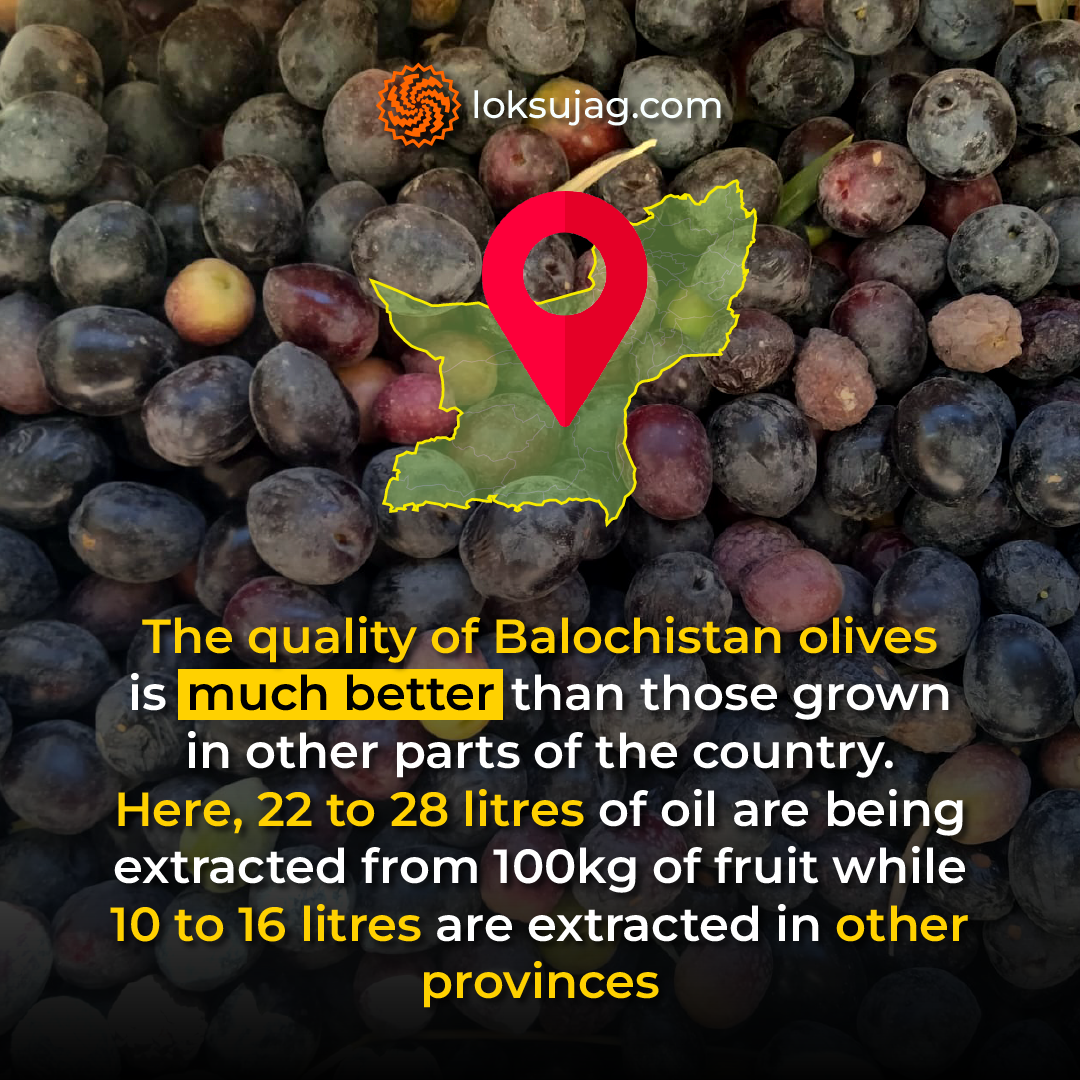
From experiments to an organised sector
The credit for this success of Balochistan olives goes to the Balochistan Agriculture Department and the Federal Ministry of National Food Security and Research, which have promoted olive farming under five different projects in the last 20 years. They have been receiving continuous support from the Italian organisation, International Centre for Advanced Mediterranean Agronomic Studies (CIHEAM-Bari).
Habibullah Kakar, deputy director of Agriculture Research Loralai, told Lok Sujag that work was done in phases on various projects to promote olive farming since 2007. The first phase (2007-12) should be called experimental in which olive plantations were planted on a limited scale in various districts, including Loralai, Zhob and Sherani.
During this period, research institutes examined the local climate, soil type and water availability to assess the potential for olive farming.
“After positive results, cultivation was expanded in the second phase (2013-18). The government distributed free olive saplings among thousands of farmers, introduced grafting techniques, and installed basic oil extraction units.This phase also involved grafting on the already growing wild olive trees of Sherani to obtain production from them.”
According to Kakar, the third phase (2019–2024) was to take olive farming to a commercial basis. During this period, millions of grafted plants were planted and modern irrigation systems (such as drip irrigation), soil improvement projects, and cold storage facilities were provided. Research institutes also introduced 17 new olive varieties in this phase. Twenty-eight kilogram of oil is being extracted from 100kg of olive fruit produced in Loralai, which is close to world standards.
Habibullah Kakar says that the gradual progress shows that olive farming has now entered the era of becoming a well-organised and sustainable sector. He believes that if the government further strengthens the current achievements, provides farmers with modern branding, processing, and export facilities, Balochistan can become a prominent olive-producing region in the world.
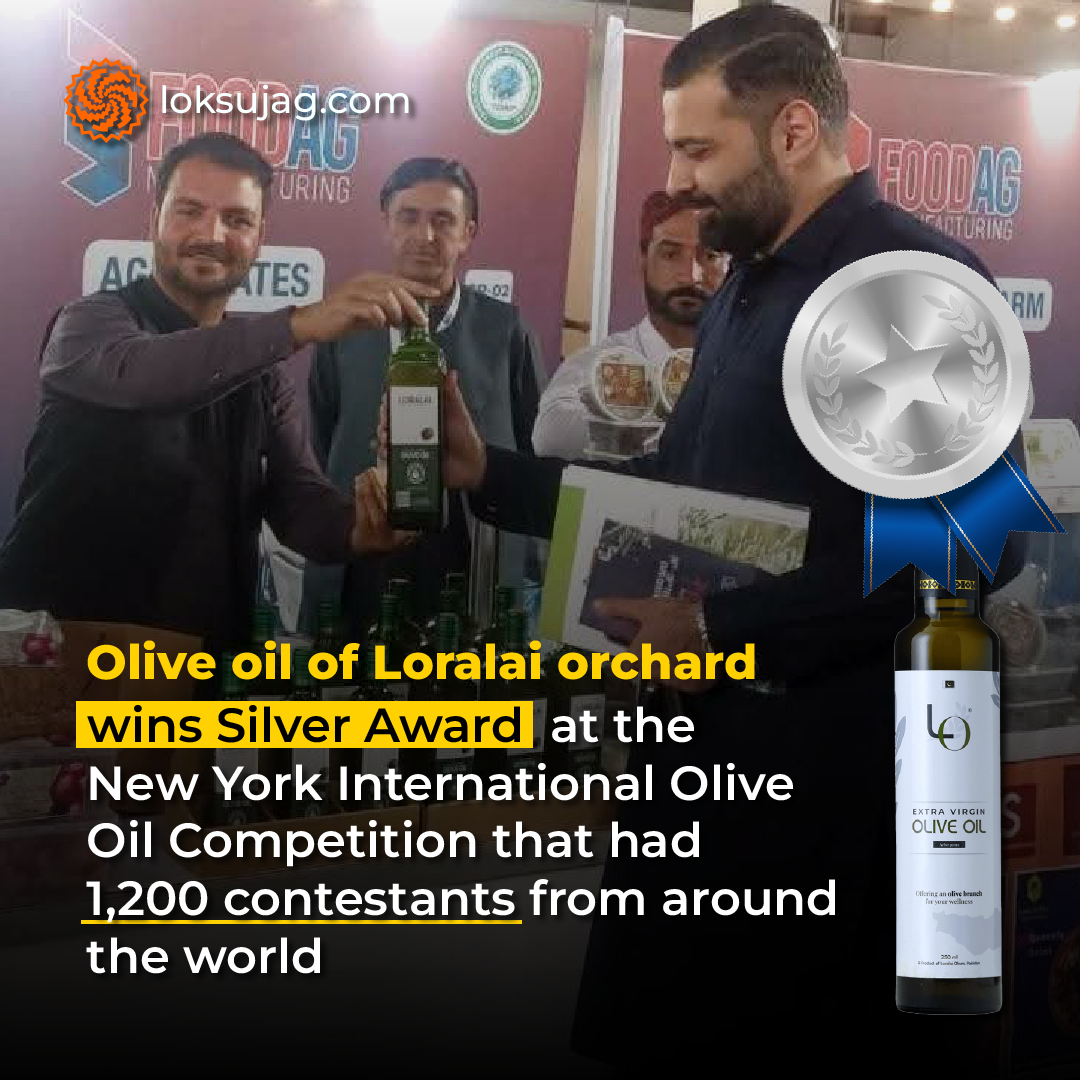
Expansion by leaps and bounds
According to the Crop Reporting Services of Balochistan, until 2017, olive trees were growing on only 200 acres in the province whose production was nominal but now the situation has changed completely.
In 2023-24, the area of olive groves in Balochistan reached 8,000 acres, which yielded about 2,500 tonnes of olives, worth more than Rs2.16 billion.
Rafiullah, farmer from Loralai, says that if the olives are properly cared for here, the plant starts bearing fruit in the first year and its oil is of high quality and is sold for Rs3,000 to Rs3,500 per liter.
Dr Yousuf of the agriculture department in Loralai says that this year more than 300,000 plants have been distributed in the district, with a survival rate of 80pc. This shows that olive cultivation has now entered the stage of commercial production here.
Provincial Secretary Agriculture Noor Ahmed Pirkani says that in the second phase of the Green Tractor Scheme, 3,000 tractors are being provided to the olive farmers at a 50 percent subsidy, for which an amount of Rs3.5bn has been allocated.
A total of 2.46 million olive seedlings have been distributed in the province so far and 17 new varieties have been introduced. The Crop Reporting Services is also developing a software at the cost of Rs150m to provide digital support to the olive farmers.
The government has also decided to build cold storages in 20 districts at a cost of Rs6.7bn, which have been completed in some districts. These measures will help preserve many agricultural commodities, including olives, for a long time.
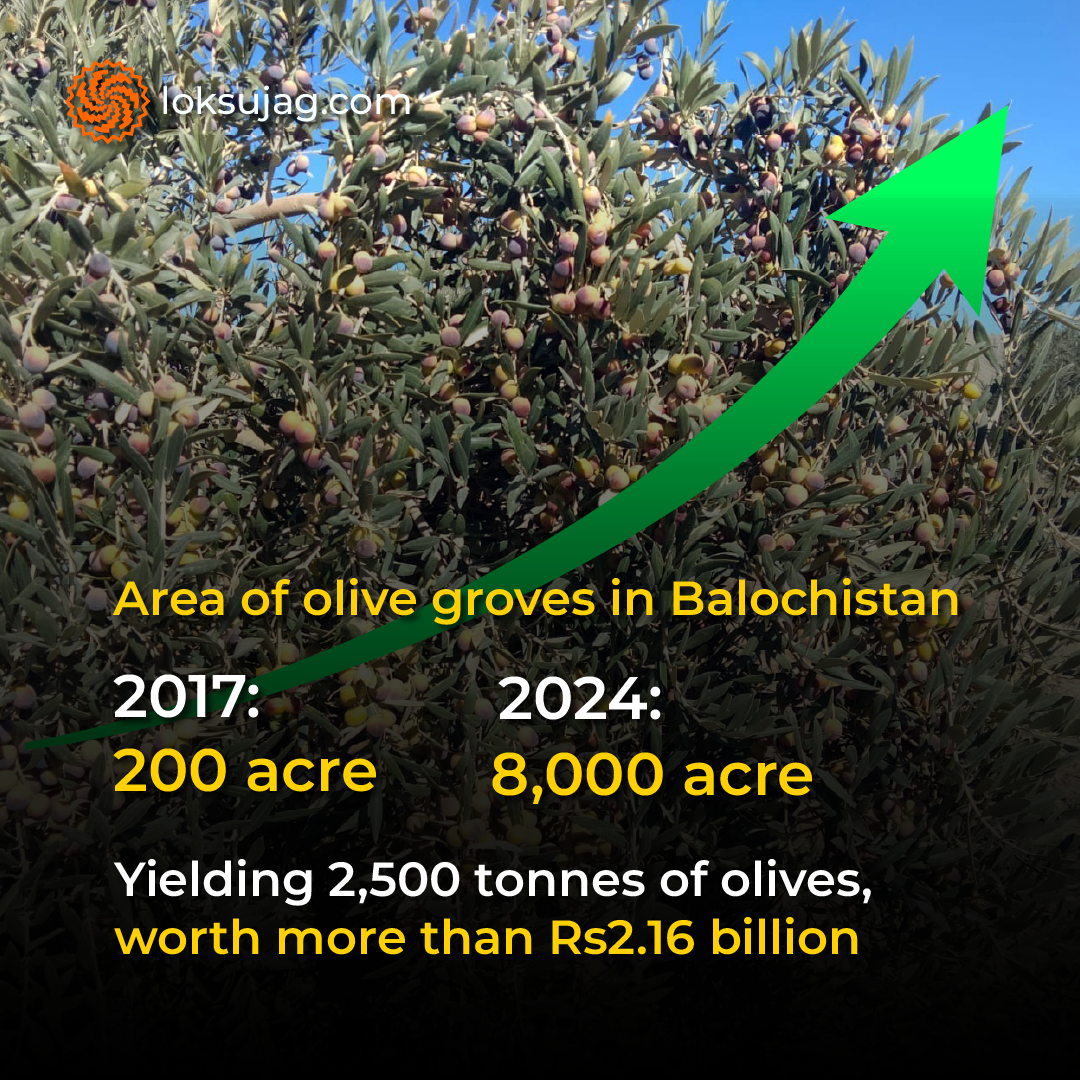
A place in global market an uphill task
Although Pakistan’s olive exports are still very modest, they are increasing rapidly. According to the Trade Development Authority of Pakistan (TDAP), Pakistan’s olive exports in 2020 were only 15 tonnes, which increased tenfold to 160 tonnes in five years.
Zainul Abidin, the authority’s national product officer, believes that Pakistan will have to move away from bulk exports and focus on its branding and move towards exports of organic, ISO certified and extra virgin oils. However, to make a place in the international market, especially in Europe and the US, it is necessary to meet many standards and obtain special certifications.
The Balochistan Agriculture Department recently signed a memorandum of understanding (MoU) with the Italian organisation, CIHEAM-Bari, for promotion of agricultural development and rural prosperity, under which the Italian organisation will provide technical assistance for the phytosanitary laboratory to be established at the Agricultural Research Institute, Sariab Road, Quetta. In addition, the institute will also train agricultural scientists from Balochistan to operate the new laboratory system.
The MoU was signed in the office of special secretary of agriculture Anees Tariq Gorgaij on the 3rd of this month. According to the agriculture department, this will be the first phytosanitary lab in Balochistan and will provide modern medical and research facilities for the diagnosis and treatment of diseases of olive trees.
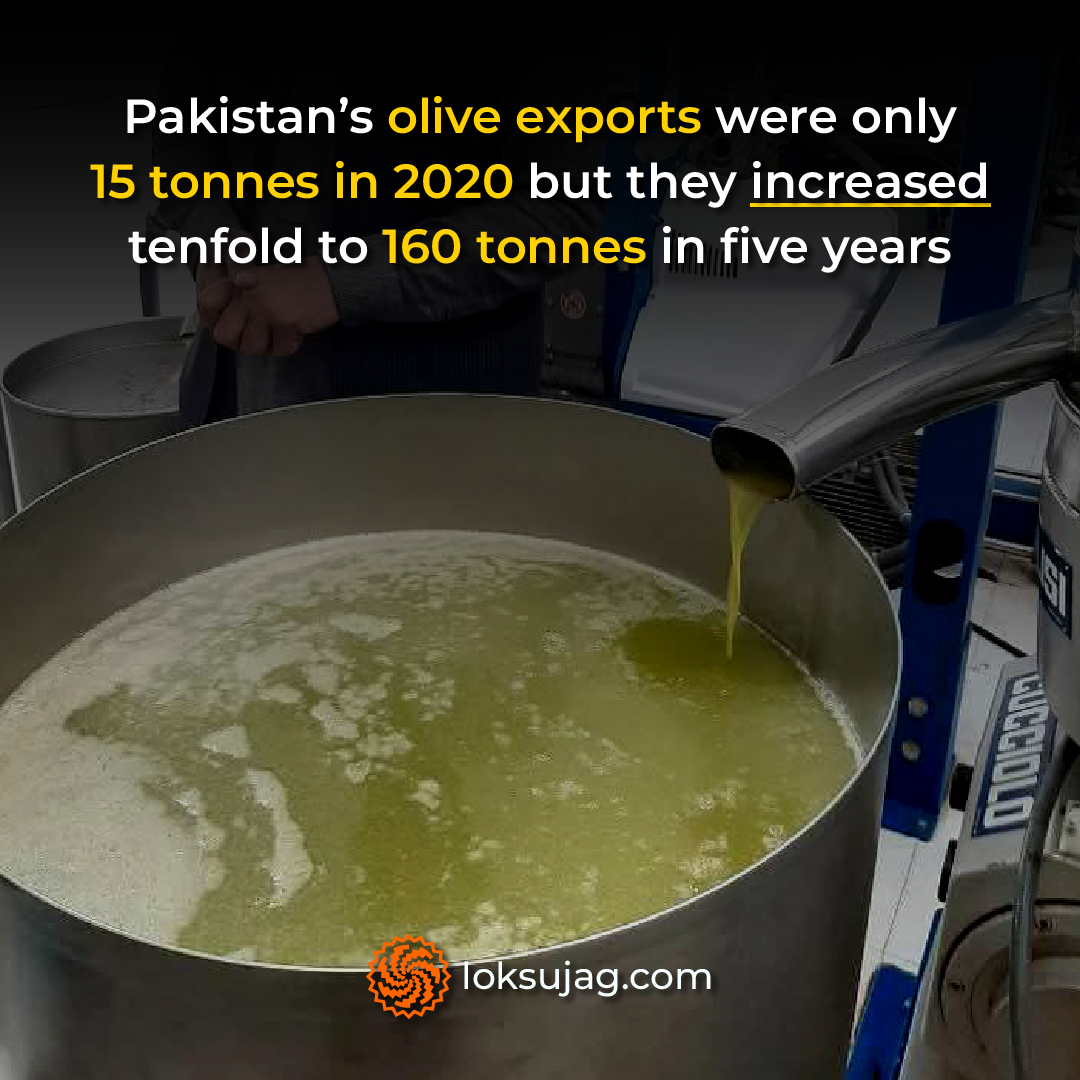
The trained staff and modern equipment of the lab will play an important role in making olive farming safe and sustainable in Balochistan.
The importance of the phytosanitary lab is not limited to dealing with diseases only, but it will also play a central role in meeting international food laws and standards related to olives and obtaining relevant certifications. Balochistan’s olive oil must obtain certifications like ISO, HACCP, GMP to access the markets of developed countries.
Habibullah Kakar believes that if the government takes the necessary steps for global branding and export, olives can prove to be a revolution in the agricultural economy of the province.
Published on 17 Jul 2025
